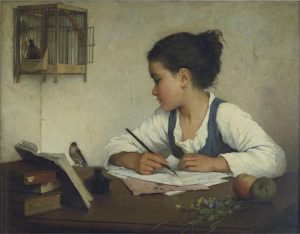Today I’m thinking about how we hear about writers. This is not only for general reading, but also for academic writing. The second, in this case, leads to the first.
One of the subjects academics ask me about or various bods want me to write about is Australian science fiction and fantasy. Until a few years ago I knew when any book was coming out and knew most of the writers and was exceptionally useful. Right now, I’m only useful on some subjects.
I can talk about writers until about 2015, and often write about writers before 1900. An article of mine on Tasma-of-the-many-names was just published in Aurealis, an Australian speculative fiction magazine. I can write about Jewish Australian writers and, in fact, do. I can also write (and do) about the links between Australian writing and the writing of other countries. Also, many books that incorporate history are still part of my terrain because, first and foremost, I’m an ethnohistorian.
Recently, I stopped writing about most contemporary Australian writers. Some I still know a bunch about, but for many I know only the names of their works. Given I have so much else to write about and don’t have the physical capacity to go chasing, I now avoid mentioning certain types of writers. I still consult, behind the scenes, when international scholars want to flesh out their knowledge, but I have to tell them that, “I know about this person and their work, but I don’t know where it belongs.” I no longer introduce Irish fans to the latest in Australian speculative fiction: we talk about other things.
Why did this change?
There are three reasons.
When I let the wider world know that I was not well, two groups of local writers dumped me from their social circles, almost instantly. This marches alongside with when my eyesight started failing and I was no longer permitted to be an award judge. It was apparently too difficult to give me lifts or to make sure that a dinner was reasonably COVID-safe or to find a type of text my eyes could read without making them worse.
These decisions by others makes it much harder for me to find out more about writing from Australia, and especially from Canberra and the Canberra region. Given how much the world of publishing is changing and how we hear about something is often somewhat random, this has significant consequences. If I can’t answer questions at an academic conference, very few of the scholars asking questions look further. They’re also overworked and under stress: this is not an easy decade for any of us.
I don’t hear about work now by these groups of writers or those who are close to them until after the work is published. I would have to put in extra work for each and every published book to find out that it has been published and if a book is in my scholarly ballpark. I have chronic fatigue, five books to finish, and I am no longer paid to write articles about groups of books. I miss being a pro-blogger and a literary magazine person, because they gave me paid time to chase things. My paid time is firmly Medieval right now, and does not include modern SFF unless I’m writing something for Aurealis.
Prior to my exclusion, chat told me what was going on and I could chase it and… I knew so much without much effort. My social circles, in fact, were what initially pushed me into writing about contemporary speculative fiction online and in magazines and giving papers at conferences. One of the symptoms of my illnesses is chronic fatigue: I will take that extra work, but only when I can. I’ve had this symptom since my 20s, but it’s only after I confessed to it that it changed what I knew by changing who would accept me in their social circles.
Only a very few non-Australian academics write about Australian speculative fiction. I know many of them. My refocus on subjects that are achievable without make me more ill affects how these writers are seen outside Canberra. It is not intentional discrimination on my part, but if I don’t have time or energy to chase up something new that touches on my areas of expertise I then write on subjects that are just as interesting to my readers, but that don’t push me beyond my capacity. Eustace the Monk is a case in point. I’ve now been asked by a number of people about Eustace, and used the same core research for each inquiry. This enables me to have a full life, despite the illness.
Second, when I was excluded from a particular science fiction convention, the writers who consulted with me there lost access to me. And me, I was no longer in a position to hear about their work while they were thinking about it, because they no longer asked me questions or did my workshops. Work by those writers has to wait, the way work by most other writers waits, for me to get around to it. Since I was first working on a dissertation and now on non-fiction books, and also write my novels, the wait is long.
The first and second reasons added together affect one group of writers in particular. When scholars and fan organisers ask me about most Canberra authors, I tell them what I know, but what I know is no longer insider-knowledge for most writers. I’m not the only one, as local academic jobs in the Humanities are few and far between. Scholarly work about Australian speculative fiction is likely to mention writers’ names in passing than to look at their work closely or to teach it at university. Those who were part of my earlier studies are still getting articles written about them or even being tagged for (paid) academic stuff as a long-term result of that work. I am not doing the research or running academic programmes: I am merely one of the half dozen people who can be asked casually about the subject. That ‘merely’ has consequences for how much attention given to some writers who are probably very deserving of scholarly work and being taught at university. Some writers still get attention, but most writers won’t be seen. This only affects a group of universities, but there are very few universities in the world that teach Australian speculative fiction as a subject. Other courses that include Australian writers will only include the extraordinary, and most of our fiction will be passed over.
The third reason, of course, is that I’m Jewish. I am no longer included on lists of writers to ask about this or that, because Jew cooties may be infectious.
So many other writers locally have no idea of my work at this point, much less my research. I joke that I’m better known in Germany than in Australia, which is not entirely true. I’m better known in some parts of Germany than in some parts of Australia. I’ve gone from being an Ambassador of Reading for the country, to being left off lists as a writer. This, again, reduces who I see and who I can recommend to others. It has, in fact, a bigger impact that the other two reasons combined. Jew cooties would not be a problem in the writing world if there had been a flurry of activity to replace the Jewish writers and publicists and editors and more. There has not been. We’re seeing an increasing numbers of holes in communication in both the writing world and in academia, and even in bookshop events, simply because of individuals who are too Jewish and whose work has not been replaced.
This is worse in the US than Australia. In Australia it’s my kind of work that’s missing. That’s too big to examine here. Maybe another day.
This disadvantages those who are not leaving me out of things, because I won’t write the general introduction to a field I am not on top of. The result right now? An introductory article I was going to write for an academic journal is not even going to be suggested. Someone else will have to write it.
When we play games with people’s lives, the person whose life is targeted is not the only victim. As a Jewish writer, my book sales are down by 75%. As a Jewish/chronically ill academic, the book sales of those I would have written about are also diminished.
The writing world is complex. Hate and exclusion do not affect just the target: they change what books we know about and what writers we want to read. My recent life is an example this.
Update: The chrnoic illnesses have ruled my week and so I put this up unedited. If you read it before 14 August, note that it is now edited! And tagged.



 In which I interview myself on National Novel Writing Month (NaNoWriMo)
In which I interview myself on National Novel Writing Month (NaNoWriMo)
 Somewhere fairly recently I was in a conversation with someone (can you tell I cannot for the life of me remember when, or with whom, the conversation occurred?) about the why of writing. The person I was talking with spoke pretty definitively about why writers write, and while her points (I can remember it was a woman I was speaking with, maybe by the time I finish this post I’ll remember her name) were valid, I thought they were also limited. As if she could not imagine reasons to write that were not hers. Which is the crux of why I write. I’m trying to figure out why people do what they do. It’s why I read, too: to understand.
Somewhere fairly recently I was in a conversation with someone (can you tell I cannot for the life of me remember when, or with whom, the conversation occurred?) about the why of writing. The person I was talking with spoke pretty definitively about why writers write, and while her points (I can remember it was a woman I was speaking with, maybe by the time I finish this post I’ll remember her name) were valid, I thought they were also limited. As if she could not imagine reasons to write that were not hers. Which is the crux of why I write. I’m trying to figure out why people do what they do. It’s why I read, too: to understand.